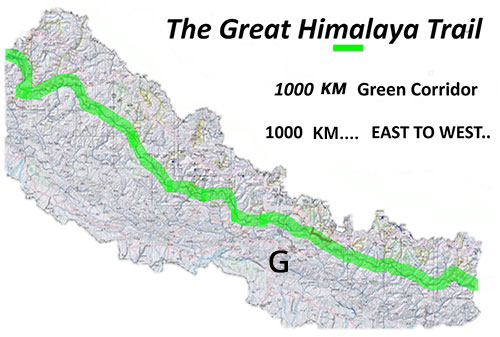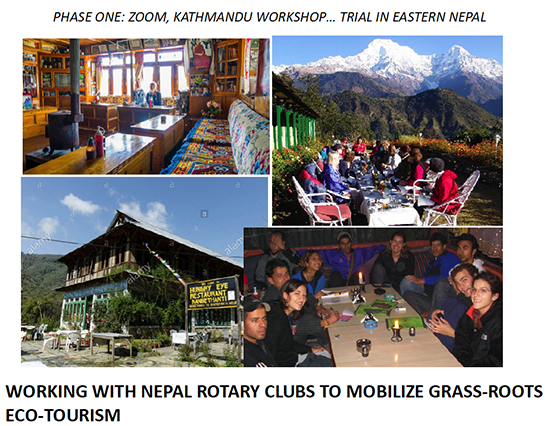about
The Great Himalaya Trail Project:1000 KM Conservation and Development Trekking Trail across Nepal.

The Great Himalaya Trail Project is a New Hampshire nonprofit corporation with IRS. 501(c) (3) tax exempt status.
The Challenge
The Great Himalaya Trail Project is creating successful and sustainable eco-tourism and micro enterprise among extremely poor mountain yet totally charming villages along a 1000 KM conservation and development hiking trail that goes from one end of Nepal to the other. Building on proven initiatives started in Makalu and other parts of Nepal over the past 20+ years, the GHT Project is harnessing a proven self-help community mobilization approachto engage thousands of some of the poorest yet proudest people in the world. Together they will create hundreds of their own micro-enterprises--tea shops, lodges, restaurants and guide services along this amazing trail, dramatically increasing their incomes.
The Mission
The mission of the of the Great Himalaya Trail Project is to support and work with a specially trained professional Nepali team to facilitate local villagers along a 1,000 KM conservation and development, ‘Green’ trekking Trail to create their own indigenous eco-tourism industry of local tea shops, restaurants, lodges and guide services to attract hikers, trekkers to enjoy the rich culture, wildlife, and mountain ecology of Nepal’s middle hills.
Building on proven initiatives started in Makalu and other parts of Nepal over the past 20+ years, the GHT Project is harnessing a proven self-help community mobilization approach to engage thousands of the poorest yet proudest people in the world.
The Opportunity
While profitable eco-tourism has flourished in the Everest and Annapurna regions, the poor yet delightful villages along the GHT have had no such opportunities. This low-cost, sustainable GHT initiative can bring these communities major economic and conservation benefits, while building community spirit. What’s more, the project will be led, managed, and conducted solely by an existing, in-place network of highly trained, experienced Nepalis who designed the pilot phase. This team includes conservation, community mobilization, micro-enterprise and eco-tourism specialists. Through this truly ‘bottom-up,’ “de-colonized” approach, local villages will ‘own’ the project from the ‘get-go.’ Technical support will be provided remotely, pro bono, by the US-based international team, thus eliminating international travel expenses. Full implementation, with lessons from this pilot, will continue with engagement of villagers along the route to mobilize other communities, until full eco-tourism facilities are available all along the 1000 KM trail.

The End Game
With an estimated total project cost not to exceed $150,000, a target of engaging approximately 20,000 villagers, and an anticipated increase in annual income of at least $50 per capita, then the projected return on investment has the potential yield of up to $1 million--lifting thousands of people from poverty to prosperity.



